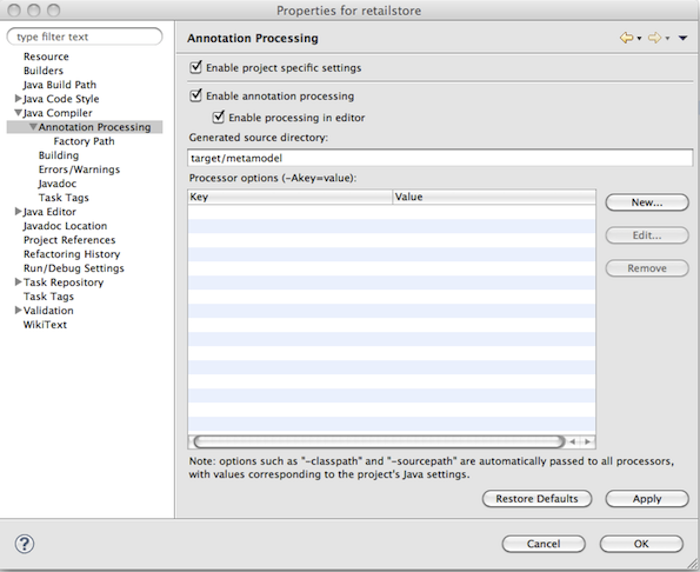使用Criteria API创建查询(JPA 2.0)
我正在尝试使用JPA 2.0中的Criteria API创建查询,但我无法使其工作。
问题在于“介于”条件方法。我读some documentation知道我该怎么做,但既然我发现了JPA,我不明白它为什么不起作用。
首先,当我写“Transaction _。”时,我看不到应该出现的“creationDate”。
我认为这可能是正常的,因为我读过元模型是在运行时生成的,所以我尝试使用'Foo_.getDeclaredSingularAttribute(“value”)'代替'Foo_.value',但它仍然不起作用一点都不。
这是我的代码:
public List<Transaction> getTransactions(Date startDate, Date endDate) {
EntityManager em = getEntityManager();
try {
CriteriaBuilder cb = em.getCriteriaBuilder();
CriteriaQuery<Transaction> cq = cb.createQuery(Transaction.class);
Metamodel m = em.getMetamodel();
EntityType<Transaction> Transaction_ = m.entity(Transaction.class);
Root<Transaction> transaction = cq.from(Transaction.class);
// Error here. cannot find symbol. symbol: variable creationDate
cq.where(cb.between(transaction.get(Transaction_.creationDate), startDate, endDate));
// I also tried this:
// cq.where(cb.between(Transaction_.getDeclaredSingularAttribute("creationDate"), startDate, endDate));
List<Transaction> result = em.createQuery(cq).getResultList();
return result;
} finally {
em.close();
}
}
有人可以帮我解决这个问题吗?感谢。
编辑:这是交易源(几乎没有任何内容,因为它是由Netbeans从我的数据库自动生成的)package projetjava.db;
import java.io.Serializable;
import java.util.Date;
import javax.persistence.Basic;
import javax.persistence.Column;
import javax.persistence.Entity;
import javax.persistence.GeneratedValue;
import javax.persistence.GenerationType;
import javax.persistence.Id;
import javax.persistence.NamedQueries;
import javax.persistence.NamedQuery;
import javax.persistence.Table;
import javax.persistence.Temporal;
import javax.persistence.TemporalType;
@Entity
@Table(name = "transaction")
@NamedQueries({
@NamedQuery(name = "Transaction.findAll", query = "SELECT t FROM Transaction t"),
@NamedQuery(name = "Transaction.findById", query = "SELECT t FROM Transaction t WHERE t.id = :id"),
@NamedQuery(name = "Transaction.findByIDAccount", query = "SELECT t FROM Transaction t WHERE t.iDAccount = :iDAccount"),
@NamedQuery(name = "Transaction.findByDescription", query = "SELECT t FROM Transaction t WHERE t.description = :description"),
@NamedQuery(name = "Transaction.findByCreationDate", query = "SELECT t FROM Transaction t WHERE t.creationDate = :creationDate"),
@NamedQuery(name = "Transaction.findByAmount", query = "SELECT t FROM Transaction t WHERE t.amount = :amount")})
public class Transaction implements Serializable {
private static final long serialVersionUID = 1L;
@Id
@GeneratedValue(strategy = GenerationType.IDENTITY)
@Basic(optional = false)
@Column(name = "ID")
private Integer id;
@Basic(optional = false)
@Column(name = "IDAccount")
private int iDAccount;
@Basic(optional = false)
@Column(name = "Description")
private String description;
@Basic(optional = false)
@Column(name = "CreationDate")
@Temporal(TemporalType.DATE)
private Date creationDate;
@Basic(optional = false)
@Column(name = "Amount")
private double amount;
public Transaction() {
}
public Transaction(Integer id) {
this.id = id;
}
public Transaction(Integer id, int iDAccount, String description, Date creationDate, double amount) {
this.id = id;
this.iDAccount = iDAccount;
this.description = description;
this.creationDate = creationDate;
this.amount = amount;
}
public Integer getId() {
return id;
}
public void setId(Integer id) {
this.id = id;
}
public int getIDAccount() {
return iDAccount;
}
public void setIDAccount(int iDAccount) {
this.iDAccount = iDAccount;
}
public String getDescription() {
return description;
}
public void setDescription(String description) {
this.description = description;
}
public Date getCreationDate() {
return creationDate;
}
public void setCreationDate(Date creationDate) {
this.creationDate = creationDate;
}
public double getAmount() {
return amount;
}
public void setAmount(double amount) {
this.amount = amount;
}
@Override
public int hashCode() {
int hash = 0;
hash += (id != null ? id.hashCode() : 0);
return hash;
}
@Override
public boolean equals(Object object) {
// TODO: Warning - this method won't work in the case the id fields are not set
if (!(object instanceof Transaction)) {
return false;
}
Transaction other = (Transaction) object;
if ((this.id == null && other.id != null) || (this.id != null && !this.id.equals(other.id))) {
return false;
}
return true;
}
@Override
public String toString() {
return "projetjava.db.Transaction[id=" + id + "]";
}
}
3 个答案:
答案 0 :(得分:7)
我认为这可能是正常的,因为我读过元模型是在运行时生成的(...)
使用注释处理在编译时生成元模型类。换句话说,您需要在编译器级别激活注释处理。 Hibernate JPA 2 Metamodel Generator文档描述了如何使用Ant,Maven和IDE(如Eclipse或Idea)执行此操作(该方法可以转换为其他提供程序)。遗憾的是,NetBeans目前不支持此功能。
因此,要么使用并配置上述构建工具之一,要么切换到另一个IDE。例如,使用Eclipse,在项目上右键单击,然后转到 Java编译器&gt;注释处理并启用它:

然后将您的提供商所需的JAR(请参阅此步骤的JPA提供商的文档)添加到工厂路径。
答案 1 :(得分:2)
我认为这里令人困惑的部分是
q.where(cb.between(transaction.get(Transaction_.creationDate), startDate, endDate));
您必须注意,在这种情况下,Transaction_是与原始Transaction实体类对应的静态实例化的规范元模型类。您必须通过使用JPA库编译Transaction_类来生成Transaction类。
eclipse有一个有用的链接:
http://wiki.eclipse.org/UserGuide/JPA/Using_the_Canonical_Model_Generator_%28ELUG%29
对于intellij IDEA
http://blogs.jetbrains.com/idea/2009/11/userfriendly-annotation-processing-support-jpa-20-metamodel/
答案 2 :(得分:-2)
在JPA开始日期和结束日期查询
public List<Student> findStudentByReports(String className, Date startDate, Date endDate) {
System.out
.println("call findStudentMethd******************with this pattern"
+ className
+ startDate
+ endDate
+ "*********************************************");
return em
.createQuery(
"select attendence from Attendence attendence where lower(attendence.className) like '"
+ className + "' or attendence.admissionDate BETWEEN : startdate AND endDate " + "'")
.setParameter("startDate", startDate, TemporalType.DATE)
.setParameter("endDate", endDate, TemporalType.DATE)
.getResultList();
}
- 我写了这段代码,但我无法理解我的错误
- 我无法从一个代码实例的列表中删除 None 值,但我可以在另一个实例中。为什么它适用于一个细分市场而不适用于另一个细分市场?
- 是否有可能使 loadstring 不可能等于打印?卢阿
- java中的random.expovariate()
- Appscript 通过会议在 Google 日历中发送电子邮件和创建活动
- 为什么我的 Onclick 箭头功能在 React 中不起作用?
- 在此代码中是否有使用“this”的替代方法?
- 在 SQL Server 和 PostgreSQL 上查询,我如何从第一个表获得第二个表的可视化
- 每千个数字得到
- 更新了城市边界 KML 文件的来源?